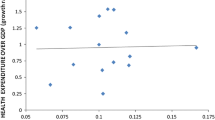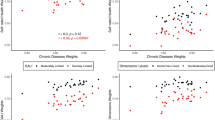Abstract
Objective: The objective of this study is to validate our earlier work on life expectancy with more recent data and, more importantly, to extend it to examine quality of life, not only the length of life.
Design and setting: The analysis focuses on the production of health, disaggregating healthcare into pharmaceutical consumption and other healthcare. Going beyond our earlier work, measures of health include life expectancy and disability-adjusted life expectancy (DALE). Also, we consider the impact of obesity. The sample was 18 Organization of Economic Cooperation and Development (OECD) countries. The measure of pharmaceutical consumption is the best that is available for these countries.
Main outcome measures and results: Confirming our earlier work, pharmaceutical consumption has a positive and statistically significant effect on life expectancy at 40 and 60 years (significant at the 0.05 level, based on a two-tailed test). The effects are slightly larger than in the earlier work. Turning to DALE, pharmaceutical consumption has a positive and statistically significant effect at birth and at 60 years (significant at the 0.05 and 0.01 levels, respectively), based on a two-tailed test. The effects on DALE are larger than the effects on life expectancy.
Conclusions: Increased pharmaceutical consumption helps improve quality of life, as well as life expectancy.





Similar content being viewed by others
References
Miller Jr RD, HE Frech III. Health care matters: pharmaceuticals, obesity, and the quality of life. Washington, DC: The AEI Press 2004. Also available from URL: http://www.aei.org/book757 [Accessed August 2004]
Miller Jr RD, HE Frech III. Is There a link between pharmaceutical consumption and improved health in OECD countries? Pharmacoeconomics 2000; 18 Suppl. 1: 33–45
Frech III HE, Miller Jr RD. The productivity of health care and pharmaceuticals: an international comparison. Washington, DC: The AEI Press, 1999
Comanor WS, Frech III HE, Miller Jr RD. Is the United States an outlier in health care and health outcomes? A preliminary analysis. In: Komlos J, editor. Health and Economic Policy. Cambridge (MA): MIT Press. In press
Zweifel P, Ferrari M. Is there a Sisyphus syndrome in health care? In: Zweifel P, Frech III HE, editors. Health economics worldwide. Amsterdam: Kluwer Academic Publishers, 1992: 311–30
Hadley J. Medicare spending and mortality rates of the elderly. Inquiry 1988 Winter; 25 (4): 485–93
Babazono A, Hillman AL. A comparison of international health outcomes and health care spending. Int J Technol Assess Health Care 1994; 10 (3): 376–81
Lichtenberg, FR. Sources of U.S. longevity increase, 1960–1997, National Bureau of Economic Research [NBER] working paper, Cambridge, MA, November 2000
Pindyck RS, Rubinfeld DL. Econometric models and economic forecasts. 4th ed. Boston (MA): Irwin McGraw-Hill, Boston, 1998
Hamilton JD. Time series analysis. Princeton (NJ): Princeton University Press, 1994
Bloomqvist AG, Carter RAL. Is health care really a luxury? J Health Econ 1997; 16 (2): 207–29
MacDonald G, Hopkins S. Unit root properties of OECD health care expenditure and GDP data. Health Econ 2002 Jun; 11 (4): 371–6
Cremieux P-Y, P Ouellette, M-C Meilleur, S Leong, P Greenberg, H Birnbaum, Pharmacetical Spending and Health Outcome in the United States, Investing in Health: The Social and Economic Benefits of Health Care Innovation 2001; 14: 59–75
Or Z. Exploring the Effects of Health Care on Mortality Across OECD Countries. OECD Labor Market and Social Policy Occasional Papers No. 46, 2000
Or Z. Determinants of Health Outcomes in Industrialized Countries: A Pooled, Cross-country, Time-series Analysis. OECD Economic Studies 2000; No. 30: 53–77
Organisation for Economic Cooperation and Development. Health at a Glance: OECD Indicators 2003: Chart 8. Increasing Obesity Rates Among the Adult Population in OECD Countries. OECD website. www.oecd.org/dataoecd/19/20/16361656.xls. Last accessed December 2003
Hill, JO, JC Peters. Environmental Contributions to the Obesity Epidemic. Science 1998; 280 (5368) May 29: 1371–1374
Winslow R, Peter Landers. Rising Global Obesity Reflects Changes in Diet and Lifestyles, Wall Street Journal 2002; July 1
McGinnis JM, WH. Foege. Actual Causes of Death in the United States, JAMA, Journal of the American Medical Association 1993; 270 (18) Nov. 10: 2207–2213
Sturm R. The Effects of Obesity, Smoking and Drinking on Medical Problems and Costs, Health Affairs 2002; 21 (2) (March/April): 245–253
Philipson TJ, RA Posner. The Long-Run Growth of Obesity as a Function of Technological Change, unpublished paper, University of Chicago, Harris School of Public Policy, 1999
Peltzman, S. Offsetting Behavior and Medical Breakthroughs, George J. Stigler Center for the Study of the Economy and the State, University of Chicago, Working Paper No. 169, 2001
Smith, T. Obesity and Nature’s Thumbprint: How Modern Waistlines Can Inform Economic Theory, unpublished paper, Economics Department, University of California, Santa Barbara, 2001
Lichtenberg, FR. Are The Benefits of Newer Drugs Worth Their Cost? Evidence from the 1996 MEPS, Health Affairs 2001; 20 (5) (September/October): 241–251
Lichtenberg, FR. Pharmaceutical Innovation, Mortality Reductions, and Economic Growth. In The Value of Medical Research, KM Murphy and R Topel editors. Chicago: University of Chicago Press, 2003: 74–109
World Health Organization. WHO Mortality Database. WHO website.www3.who.int/whosis/menu.cfm?path=whosis,whsa&language=english. Last accessed December 2003
Organization for Economic Cooperation and Development. OECD Health Data 2000. Paris: OECD
Cutler DM, M McClellan. Is Technological Change in Medical Care Worth it? Health Affairs 2001; 20 (5) (September/ October): 11–29
Nordhaus WD. The Health of Nations: The Contribution of Improved Health to Living Standards. In The Value of Medical Research, KM Murphy and R Topel editors. Chicago: University of Chicago Press, 2003: 9–40
Cutler DM, E Richardson. Measuring the Health of the U.S. Population, Brookings Papers on Economic Activity: Microeconomics (1997): 217–271
Acknowledgements
Our earlier work on this matter was supported by a grant from the Institute d’Etudes Politiques (Sciences Po) de Paris. The more recent work, reported here, was supported by a grant from Pfizer, Astra-Zeneca, Bristol-Meyers Squibb and Merck. Versions of this paper have been presented at Talloires, France; UCLA; the University of California, Berkeley; Curtin University in Perth, Australia; the American Enterprise Institute; and the International Health Economics Association meetings in York, England. We are grateful for comments from participants, especially Tom Rice and Ernst Berndt. Further, we are grateful for expert research assistance and helpful comments from Dominick Esposito.
Author information
Authors and Affiliations
Corresponding author
Rights and permissions
About this article
Cite this article
Frech, H.E., Miller, R.D. The effects of pharmaceutical consumption and obesity on the quality of life in the Organization of Economic Cooperation and Development (OECD) countries. Pharmacoeconomic 22 (Suppl 2), 25–36 (2004). https://doi.org/10.2165/00019053-200422002-00004
Published:
Issue Date:
DOI: https://doi.org/10.2165/00019053-200422002-00004




